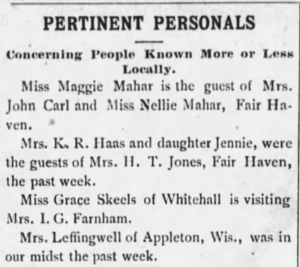By Kyle Callahan
In the 21st century, neighbors, families, and friends have so many ways to keep tabs on each other and the place they call home. Poultney-ites use Facebook groups, the Front Porch Forum, and other social networks to notify each other of lost dogs, invite each other to public events, gossip about local news, ask for recommendations, and spread warnings about severe weather events. Like everyone else, they also share their personal lives and post photographs of their parties, meals, accidents, celebrations, and more.
Social critics lament this urge to share, harkening back to the “golden days” when people didn’t feel the need to tell everyone what they were doing on Saturday night and whom they were with. But as anyone who has ever glanced through the newspapers of the 1800s can tell you, the human urge the publicize life’s mundane details is nothing new.
Thanks to this urge, historians know that as of July 14, 1882, “Miss Emma Lynde of Brooklyn, N.Y.” was “the guest of Mrs. Ruggles” in Poultney and that “D.A. Benedict, son of J.A. Benedict, who is clerking in Rutland, was home on a visit this week.”

In the July 13, 1898 issue of the Poultney Advertiser, residents learned that “Walter W. Maranville of Rutland visited his parents on Sunday” and that “Rollin Wilbur and Seth Woodworth went to Lake George Monday where they will take a few days fishing.”
During the week of July 19, 1895, the Poultney Journal published the news that “a party of twenty-three young people enjoyed a straw ride to Granville via Wells and returning through Raceville on Wednesday evening.” In this same issue, Poultney-ites learned that “O.T. Kellog…[possessed] the finest cauliflower we’ve ever seen…ten inches across and closely formed and beautifully white.” As the editor noted for all to read, “Mr. Kellog is becoming a fine gardener.”
Historians also know that on June 29, 1829, someone from Poultney left a pocketbook containing cash and papers in the Bake-House in Burlington, and someone named Joshua Brooks hoped to find its original owner. Locals learned about this Good Samaritan from the Northern Spectator, which on the same day published the news that in the State of New York, “all who were held as slaves previously to the 4th of July, of the present year, are absolutely and unconditionally emancipated.”
Thanks to the social networks, future historians will learn that on June 17, 2021, Patricia McWilliams, the owner of Poultney’s Hermit Hill bookstore, introduced her new dog, Zoli, to the Poultney River and hopes he’ll be a swimmer.
The nineteenth century’s publications of daily minutia shared the same space and ink as news of the world events. It’s similar with the social feeds, where Zoli’s hesitant steps along the river bank were no less important than the news from Brussels that Europe will phase out its use of fossil fuels within the next decade.
Technology may have changed the way humans share the comings and goings of our everyday lives, but the urge to do so has been and will always be with us.

Comments are closed.